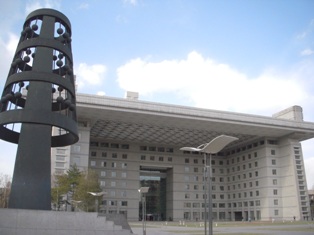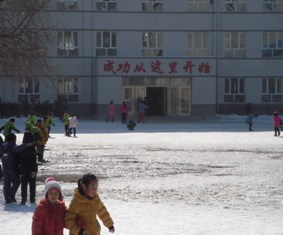2012年3月 月次レポート(楊殿閣 アメリカ)
Location: Beijing Normal University
Time: March, 2012
Name: Denka Yanagi
ITP Monthly Report
The day I arrived at Beijing from New York was just the time when the Eleventh National People's Congress was being held in China. The newspaper of the day I read on my flight said that this national Congress would make some significant decisions, including enforcement of democracy and globalizing of education. The most interesting news announced within my visit was that Wen Jiabao, the premier of the State Council, had stated that China had already achieved the goal called "Liang Ji", under efforts dating back 25 years, to the fifth session of this Congress. This is one of the biggest national education projects; providing compulsory education for all children and aiming to eradicate illiterate among adults. However, many critics point out that the Chinese government tend to ignore the real situations of its country, especially that in rural areas or minority groups. There are many people still facing difficulty in accessing education. Some scholars I met in Beijing also told me that, sometimes, even an official statement or data which is provided by the government differs from reality, and it is important to be aware of this when you deal with these resources in your research. This issue occurs not only in China, but also in most developing countries.


I had chances to talk over educational issues in China with some scholars who are working at Beijing Normal University and UNESCO Beijing Office in addition to collecting date for my research. The contents of these interviews can be divided into two categories. One is the modern history of education in China, and the other one is education development in China's rural areas.
The modern education history in China starts from 1978, after "the great cultural revolution." In the year 1978, China began to restart its higher education entrance examination, which had been stopped during the period of "the great cultural revolution." As to restarting the higher education entrance examination was the first step in educational reconstruction, the Chinese government has mainly implemented resources in higher education to respond to the new social demands; people who have highly technical skills and talents can contribute to the new national development strategy-market economy. This is a very unique strategy of educational policy compared to other developing countries, where the first step of educational development is focus on primary education. Because only a few people who dominate particular groups or classes are able to enter higher education, this educational policy is a main reason for the accelerating educational gap within the nation. This education gap is also a reflection of the population structure. The population of rural areas is much greater than the population of cities in China. In this decade, the Chinese government regards rural development as the top priority of national development. Thus, educational development in rural areas, the second main topic of my interview, has been a focus of the government since the late 1990s. I interviewed some scholars several times within this month, and the main topics in education development in rural areas of my interviews were 1) financial support, 2) management revolution, 3) teacher training, 4) structural adjustment, and 5) educational responsibility. All five topics relate to the primary education level.
